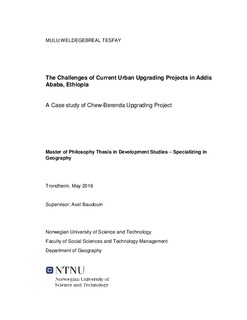| dc.description.abstract | In 2008, the city government of Addis Ababa decentralized the task of urban upgrading down to the sub cities. More than 200 upgrading projects have been prepared by the sub cities during these last five years. So far only a few studies has been conducted to assess the current upgrading projects in the city. This study, therefore, intend to contribute to the debate by identifying and analyzing the major challenges of the current upgrading projects undergoing in Addis Ababa by focusing on the planning process and outcomes of the project undertaken in the Chew-Berenda area as a case study. The study employed an in-depth with 24 informants and review of relevant publications. The findings were analyzed using qualitative methods of analysis.
The planners use there are three basic criteria for the selection of upgrading project areas in the Addis Ketema sub city urban planning office; - Initially, the area should has to be placed under the category of upgrading intervention areas, in the city master plan proposal; next, there should be a high proportion of houses existing with poor access and poor-drainage facilities; and, finally, that there are sanitation problems in the area. More specifically the Chew-Berenda upgrading project had five objectives. These were: Ensuring sanitation in terms of sewage disposal and solid waste management; providing vehicular access and drainage facilities; creating income-generating economic opportunities; creating green area, and open spaces to the community; and mitigating security problems.
The study found out that the current upgrading projects undergoing in Addis Ketema sub city administration have been facing limitations at all levels. The planners have no full professional freedom, they cannot apply what they as professionals intended to do in the upgrading projects. The planning process of the upgrading projects is characterized surrounded by lack of good governance, demonstrated in low public participation and lack of transparency.
The findings of the study also shown that there is no collaboration nor integration between the institutions of the sub city administration regarding the upgrading projects. Most of the institutional stakeholders do not participate in the planning and implementation of the projects. The absence of a responsible institution for implementation, the short project life time, and the absence of the legal background to enforce the relevant institution to participate in the planning and implementation of upgrading projects are serious in Addis ketema sub city. All this lead to the result that, the upgrading projects in Addis ketema sub city administration couldn’t achieve their intended goals. One can wonder if this is a common fate for most other upgrading projects in Addis Ababa. | nb_NO |
